| Manufacturer: | Rocket Pad |
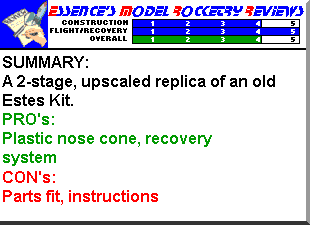 (08/30/05) RocketPad must be doing something right in
their kit designs, because, for some reason, I keep going back to them to pick
up a kit here and there. This is my third kit and I have a couple more in the
queue. I am not a huge fan of purchasing clones, however, when I saw an upscale
of the 1960's Estes Pee Wee, I was compelled to purchase it. The upscaled
two-stager really caught my eye. I would probably have over looked the original
13mm version having lost too many single stage 13mm rockets to altitude,
wind, trees, and such.
(08/30/05) RocketPad must be doing something right in
their kit designs, because, for some reason, I keep going back to them to pick
up a kit here and there. This is my third kit and I have a couple more in the
queue. I am not a huge fan of purchasing clones, however, when I saw an upscale
of the 1960's Estes Pee Wee, I was compelled to purchase it. The upscaled
two-stager really caught my eye. I would probably have over looked the original
13mm version having lost too many single stage 13mm rockets to altitude,
wind, trees, and such.
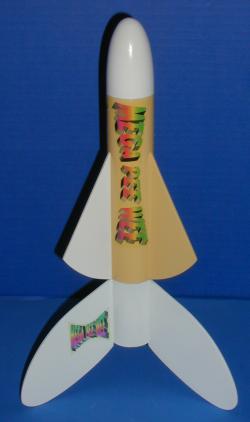 RocketPad is still using e-Bay which I'm not thrilled
with because I know the overhead is made up in the price of the kit. Then
again, if they had their own site and had to pay for space and design, then I
guess I'd be paying the same or more for their overhead. Nonetheless, I bought
it through e-Bay. RocketPad is using the "Buy it Now" feature which
improves my feelings since I don't have to manage bids.
RocketPad is still using e-Bay which I'm not thrilled
with because I know the overhead is made up in the price of the kit. Then
again, if they had their own site and had to pay for space and design, then I
guess I'd be paying the same or more for their overhead. Nonetheless, I bought
it through e-Bay. RocketPad is using the "Buy it Now" feature which
improves my feelings since I don't have to manage bids.
The kit includes a 7" long, 1.6" diameter upper stage body tube, and a 2.75" long, 1.6" diameter booster body tube. There is a plastic nose cone (just like an Estes Baby Bertha) and balsa stock to cut out the fins from. The motor mounts are 18mm tubes and the appropriate black fiber centering rings. The recovery system is made up of a Kevlar® shock tether and 25" of 1/8" elastic shock cord. There is also a plastic streamer, a coupler, a 3/16" launch lug, clay nose weight, and a decal sheet to complete the make up of the kit.
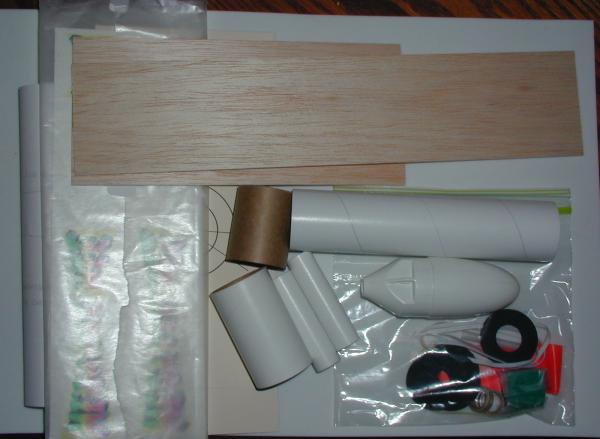
CONSTRUCTION:
The instructions are printed on a 5 pages of 8½ x 11" paper (single sided). There are 12 more pages with black&white and color photos and some hand drawn illustrations. This has been the typical instruction package from RocketPad: Written instructions followed by photos. The photos are not interlaced within the instructions.
If you have read my previous reviews of RocketPad kits, you would know that I have commented on the spelling and grammar. I know, based on some of my reviews, that may be like the Pot calling the Kettle black. With that being said, these instructions were the best that I have had from RocketPad. I actually only came across two spelling errors both of which a spell checker wouldn't have found (step 6, "sue" instead of "sure"; step 8 "pace" instead of "place").
RocketPad rates this kit a skill level 3. I think it is easier than 3.
The assembly of this rocket had a couple of interesting twists in it. Let me describe the build:
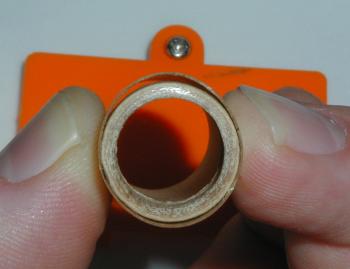 The motor tubes are marked for "B"ooster and
"2nd" (for Sustainer). These are then assembled with the black fiber
centering rings and the thrust ring for the Sustainer. I like the black fiber
centering rings but they get black everywhere! They fit very nicely. It is also
nice to have the upper centering ring pre-drilled for the attachment of the
Kevlar®
shock tether. I did find the thrust ring to be extremely loose! I packed it
with enough glue though, so no problem.
The motor tubes are marked for "B"ooster and
"2nd" (for Sustainer). These are then assembled with the black fiber
centering rings and the thrust ring for the Sustainer. I like the black fiber
centering rings but they get black everywhere! They fit very nicely. It is also
nice to have the upper centering ring pre-drilled for the attachment of the
Kevlar®
shock tether. I did find the thrust ring to be extremely loose! I packed it
with enough glue though, so no problem.
Once the booster motor mount is assembled and the coupler is added, then the upper stage motor mount is glued in place. RocketPad did a nice job explaining this assembly step (#17). If followed correctly, the booster motor tube butts up against the sustainer's.
The tubes are marked using a 2D tube marking guide. I decided to hook my booster to my sustainer and extend the line in a door jam up both tubes. The instructions had you do each one separately.
Fin time. The fin templates are on card stock and appear to be hand-drawn. Nonetheless, they work and allow you to cut out the 6 needed fins.
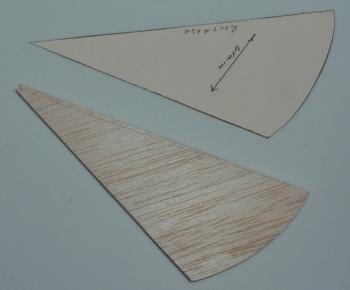 I didn't like the arrangement of the upper fins. I
have always been taught to ensure that your balsa grain is parallel to your
leading edge. In this case, RocketPad had the balsa grain perpendicular to the
leading edge. Perhaps there are other schools of thought, but I didn't like it.
I didn't notice it until I had finished cutting them out and was sanding
them.
I didn't like the arrangement of the upper fins. I
have always been taught to ensure that your balsa grain is parallel to your
leading edge. In this case, RocketPad had the balsa grain perpendicular to the
leading edge. Perhaps there are other schools of thought, but I didn't like it.
I didn't notice it until I had finished cutting them out and was sanding
them.
With the above grain problem, perceived or not, and my desire to try to have a better way to finish balsa fins, I decided to try a new technique. I first took the fins and cut out newspaper covers. Then, I used a foam brush and brushed on Modge Pog evenly on each fin, covered it with the newspaper cover. I then slipped it between some wax paper and pressed with the edge of a paperback to squeegee excess glue out. I then moved to new wax paper and put under a few books for a day.
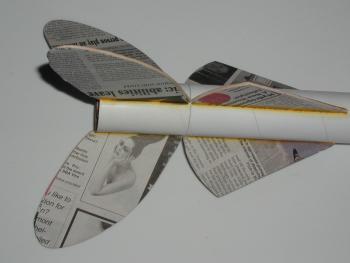
Once dry, each fin was glued into place and a fillet was added using wood glue.
The recovery system includes a Kevlar® shock tether. This is tied through two pre-drilled holes in the upper centering ring. A 25" piece of 1/8" wide elastic shock cord it tied to it. This is tied to the nose cone. The 37" long, 1.25" wide bright orange plastic streamer is attached to the shock cord.
The nose cone is finished after the clay nose weight is packed into its tip.
RocketPad gives some basic guidance to finishing, including sanding and sealing. They suggest painting the rocket all white except the nose cone, which should be red.
I finished this rocket rather quickly due to the newspaper covering for the fins and the plastic nose cone it came with. I used my typical multiple coats of Plastic-Kote Primer and sanding in-between. The fins finished great, with just a bit of clean up to do on the edges. I then used Walmart White and Yellow paint (additional comments about Walmart paint).
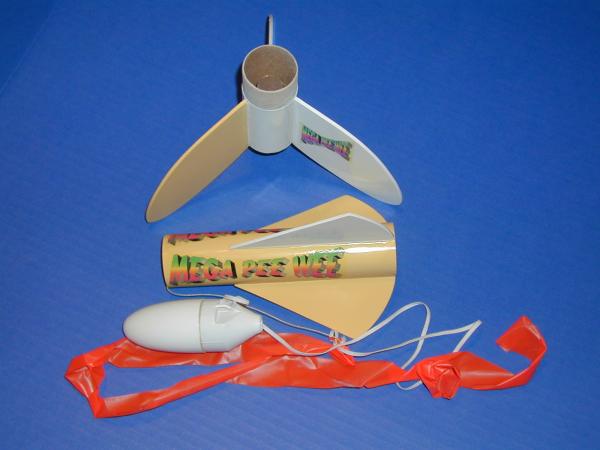
The decals were water-transfer decals and they look and applied nicely.
Overall, for CONSTRUCTION I would rate this kit 4 points. The instructions are capable of walking a novice builder through the assembly of this rocket. The quality of parts is good. The fit of the parts, other than the very loose thrust ring, was good. The balsa fin grain concerns me, but I took steps that strengthen the fins anyway. Recovery system is set up nicely. Love the decals.
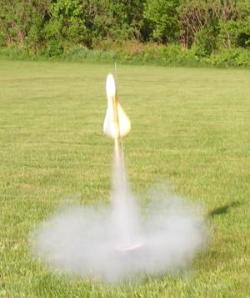 FLIGHT/RECOVERY:
FLIGHT/RECOVERY:
RocketPad recommends the B6-0 or C6-0 for the booster and an A8-5, B6-6, or C6-7 for the sustainer.
RocketPad indicates the finished rocket should weigh 2.7 ounces. My finished rocket weighed 3.1 ounces.
My first flight was on a Quest A6-4 in a single-stage configuration. I did this primarily because I wanted to test altitude. The sustainer flew great and recovered quickly on the streamer. I'm ready for the 2-stage configuration!
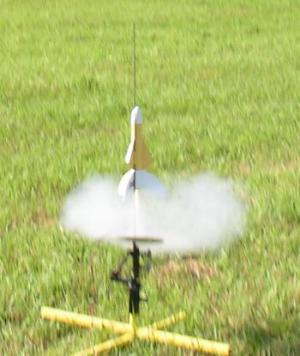 My next flight was in the 2-stage configuration. I
used my first ever Quest B6-0 for the booster and a Quest A6-4 for the
sustainer. I didn't want this thing to go out of sight. So, the flight was set
up and ready to go. Upon ignition the rocket lifted straight and at maybe 50
feet the sustainer ejected and the A6 took off. The booster fell just to the
right of me, while the sustainer kept on going. Glad I used an A6. With the
streamer it was easy to track and recover. Nice flight.
My next flight was in the 2-stage configuration. I
used my first ever Quest B6-0 for the booster and a Quest A6-4 for the
sustainer. I didn't want this thing to go out of sight. So, the flight was set
up and ready to go. Upon ignition the rocket lifted straight and at maybe 50
feet the sustainer ejected and the A6 took off. The booster fell just to the
right of me, while the sustainer kept on going. Glad I used an A6. With the
streamer it was easy to track and recover. Nice flight.
I'm looking forward to flying some more and after a few flights, I'm going to try a C6 to C6 combination. Outta-here!
For FLIGHT/RECOVERY, I would rate this rocket 5 points. This is a nice little flier. The booster adds enough weight to ensure that you can see the staging and allow recovery of it. I'll add information as I get more flights.
I give the rocket an OVERALL rating of 4 points. Again, a nice little rocket with some nice decals. Needs some refinement to be perfect, but I'd recommend it.
 |
 |